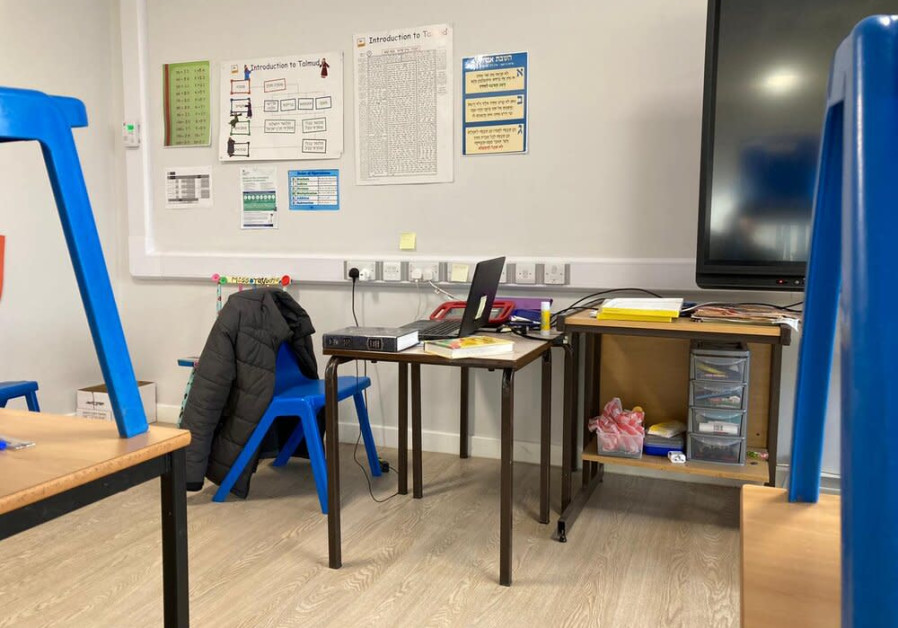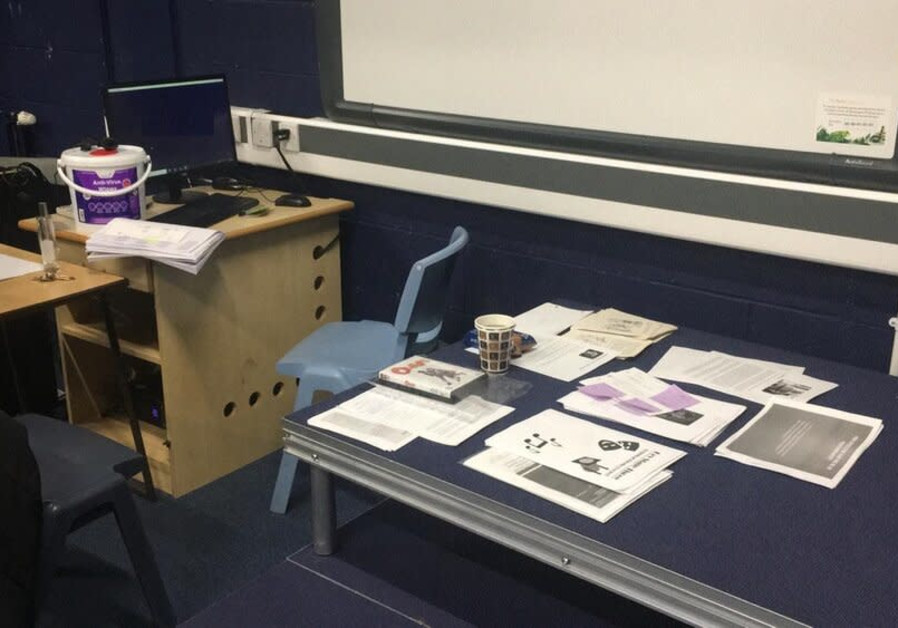The coronavirus pandemic has changed the world as we know it and will continue to impact our lives for the foreseeable future. But how will it be remembered by those not here to live through it? How will our future generations look back at this challenging period in human history?The global campaign of combating the spread of the virus has known both failures and unparalleled success stories, with great sacrifices required from all of us to ensure a safe and gradual return to the life we once knew. On the other hand, the pandemic has highlighted not only health concerns, but social ones as well, often reflecting deep societal divisions. And while we are still dealing with the pandemic and its consequences, some have started thinking about the future and the ways the pandemic will be perceived in the grand scheme of things. Teachers’ submissions for the “Classroom Look in Lockdown” project. (Credit: Courtesy)Gideon Leventhall-Airley, Head of History at King David High School, Manchester, United Kingdom, believes that highlighting the education system and the ways it managed to adapt to drastic changes is one good way to document the pandemic, as it characterizes one of its major aspects.Together with Grant Rogers, a visual artist from Berlin, Leventhall-Airley sought to create a visual art project that would shed a light on teachers during the pandemic and on the ways they have managed to overcome difficulties and maintain quality education for their students.And while such a project was eventually the result, the idea came to him from an unexpected encounter. One of his students had appealed to him, asking if she could return to school after months of learning from home.
Teachers’ submissions for the “Classroom Look in Lockdown” project. (Credit: Courtesy)Gideon Leventhall-Airley, Head of History at King David High School, Manchester, United Kingdom, believes that highlighting the education system and the ways it managed to adapt to drastic changes is one good way to document the pandemic, as it characterizes one of its major aspects.Together with Grant Rogers, a visual artist from Berlin, Leventhall-Airley sought to create a visual art project that would shed a light on teachers during the pandemic and on the ways they have managed to overcome difficulties and maintain quality education for their students.And while such a project was eventually the result, the idea came to him from an unexpected encounter. One of his students had appealed to him, asking if she could return to school after months of learning from home.
if(window.location.pathname.indexOf(“656089”) != -1){console.log(“hedva connatix”);document.getElementsByClassName(“divConnatix”)[0].style.display =”none”;}“In that one moment [she] encapsulated the ‘upside-down’ experience of lockdown-learning,” he realized. In other words, children want to return to school. They miss their friends; they miss learning in a social environment.And teachers are no different. “Educators are part of a community,” Leventhall-Airley told The Jerusalem Post. “Teaching is a profession that is fundamentally social and community-based, and it has had to make extraordinary adjustments,” he said. Teachers’ submissions for the “Classroom Look in Lockdown” project. (Credit: Courtesy)The visual project initiated by Leventhall-Airley focuses exactly on this aspect – the gap that was created in classrooms, and the ways teachers managed to fill the educational void created by such an absence.Titled “Classroom Look in Lockdown,” the project was first launched in the UK and asked teachers to document their teaching environments as an artistic photographic record, while encouraging them to reflect on their own personal experience, allowing any and all interpretations. “While we’ve all become accustomed to classes of 20-30 pupils accessing learning via Zoom and MS-Teams and GoogleClassroom, these photographs reveal what goes on behind the computer screen: The creative and dynamic effort made by teachers on the new ‘virtual frontline,’ maintaining engagement and learning for all,” Leventhall-Airley said.
Teachers’ submissions for the “Classroom Look in Lockdown” project. (Credit: Courtesy)The visual project initiated by Leventhall-Airley focuses exactly on this aspect – the gap that was created in classrooms, and the ways teachers managed to fill the educational void created by such an absence.Titled “Classroom Look in Lockdown,” the project was first launched in the UK and asked teachers to document their teaching environments as an artistic photographic record, while encouraging them to reflect on their own personal experience, allowing any and all interpretations. “While we’ve all become accustomed to classes of 20-30 pupils accessing learning via Zoom and MS-Teams and GoogleClassroom, these photographs reveal what goes on behind the computer screen: The creative and dynamic effort made by teachers on the new ‘virtual frontline,’ maintaining engagement and learning for all,” Leventhall-Airley said. Teachers’ submissions for the “Classroom Look in Lockdown” project. (Credit: Courtesy)The project is “not meant to compare,” he points out, “but to properly document experiences and the gap that has been filled,” he adds, hoping that the project will one day help people understand the changing dynamics that the education system went through during the pandemic.“How do you illustrate what is not there? This project amplifies the silence of absence; the somehow deafening absence of the pupils from their classroom,” explained Rogers, who served as the artistic consultant of the project. “Every picture of an empty classroom demands that we use our imagination to fill the spaces,” he said. “These empty rooms cry out for their pupils, but one person is always present… the person who made this record: their teacher.”
Teachers’ submissions for the “Classroom Look in Lockdown” project. (Credit: Courtesy)The project is “not meant to compare,” he points out, “but to properly document experiences and the gap that has been filled,” he adds, hoping that the project will one day help people understand the changing dynamics that the education system went through during the pandemic.“How do you illustrate what is not there? This project amplifies the silence of absence; the somehow deafening absence of the pupils from their classroom,” explained Rogers, who served as the artistic consultant of the project. “Every picture of an empty classroom demands that we use our imagination to fill the spaces,” he said. “These empty rooms cry out for their pupils, but one person is always present… the person who made this record: their teacher.” Teachers’ submissions for the “Classroom Look in Lockdown” project. (Credit: Courtesy)Leventhall-Airley believes that the coronavirus was a catalyst for changes that the profession of teaching would have to go through anyway, and says that from his experience, teachers are managing the change amazingly. Regarding criticism of the effectiveness and educational value provided by distance learning, he notes that people always fear change.“If your parents told you that their experience from the classroom is the same as yours, I’d worry,” he told the Post. “Things change – they develop.” Having started in several schools in the UK, Leventhall-Airley now hopes to expand the online exhibition to perspectives from other countries, as he continues to try to “humanize the experience of teachers and students” during the coronavirus pandemic and to “provide a visual resource for teachers and pupils alike in the discussion of learning in isolation.”
Teachers’ submissions for the “Classroom Look in Lockdown” project. (Credit: Courtesy)Leventhall-Airley believes that the coronavirus was a catalyst for changes that the profession of teaching would have to go through anyway, and says that from his experience, teachers are managing the change amazingly. Regarding criticism of the effectiveness and educational value provided by distance learning, he notes that people always fear change.“If your parents told you that their experience from the classroom is the same as yours, I’d worry,” he told the Post. “Things change – they develop.” Having started in several schools in the UK, Leventhall-Airley now hopes to expand the online exhibition to perspectives from other countries, as he continues to try to “humanize the experience of teachers and students” during the coronavirus pandemic and to “provide a visual resource for teachers and pupils alike in the discussion of learning in isolation.”
Online gallery: https://historypix.uk/lockdownSubmissions can be sent to [email protected] group where teachers can share their work: www.facebook.com/groups/lookoflockdown/
Source
Related posts:
Views: 0
 RSS Feed
RSS Feed

















 February 26th, 2021
February 26th, 2021  Awake Goy
Awake Goy  Posted in
Posted in  Tags:
Tags: 
















